Economy
Climate researchers show we’re actually “safer than ever from climate” catastrophes

The climate safety denial movement
I and others have documented that we’re safer than ever from climate. Catastrophists can’t refute us, so they’re now saying that disaster deaths don’t matter!
|
|
For decades climate catastrophists have portrayed climate disasters as getting deadlier and deadlier.
Now that I and others have documented that we’re safer than ever from climate, catastrophists are saying that disaster deaths don’t matter!
- Reuters says “Drop in climate-related disaster deaths not evidence against climate emergency.”
But a drop in deaths from something—here, a 98% drop—is obvious evidence against it being an emergency.
Would Reuters say: “98% drop in flu deaths not evidence against flu emergency”?¹
- Why is Reuters, along with The New York Times, PolitiFact, and USA Today, claiming that a 98% drop in climate disaster deaths doesn’t contradict their climate emergency narrative? Because it obviously does, and they can only save their narrative by intimidating us into denying the obvious.²
- The central narrative of climate catastrophists is that fossil fuels and their CO2 emissions are killing more and more people via climate disasters.
This narrative has always had a fatal weakness: it totally contradicts the data, which show plummeting climate disaster deaths.³
- Why are climate disaster deaths plummeting as fossil fuel use and CO2 emissions rise?
Because the enormous ability uniquely cost-effective and scalable fossil fuel energy gives us to master climate danger far outweighs any new climate challenges from CO2 emissions.
- An example of fossil-fueled climate mastery overwhelming CO2 impacts is drought.
Any contribution of rising CO2 to drought has been overwhelmed by fossil-fueled irrigation and crop transport, which have helped reduce drought deaths by over 100 times over 100 years as CO2 levels have risen.⁴
- Over the last decade, I and a number of others, including Bjorn Lomborg and Michael Shellenberger, have challenged catastrophism by pointing to declining climate disaster deaths.
Catastrophists couldn’t refute our argument. So instead they pretended it didn’t exist.
Until last year.⁵
- In 2023, climate catastrophists finally felt compelled to address the fact that climate disaster deaths have plummeted (driven by fossil-fueled climate mastery).
Because of honesty? No—because Presidential candidates started bringing it up and persuading people with it.
- Here is Vivek Ramaswamy during his Presidential campaign referring to a 98% decline in climate disaster deaths—and, crucially, giving fossil fuel energy credit.
- Here is Ron DeSantis during his Presidential campaign referring to a 98% decline in climate disaster deaths—and, crucially, giving fossil fuel energy credit.
- The 98% decline in climate disaster deaths, driven by fossil fuels, is a blockbuster fact: it shows that we are experiencing not fossil-fueled climate emergency but fossil-fueled climate safety.
But instead of being happy, catastrophists engage in climate safety denial.
- Here are 3 recent instances of climate safety denial—from Reuters, PolitiFact, and USA Today. All have long portrayed climate deaths as a fast-increasing problem. But now they claim deaths don’t matter.
https://www.reuters.com/fact-check/drop-climate-related- disaster-deaths-not-evidence- against-climate-emergency- 2023-09-19/ - Climate safety denial utilizes 5 main myths to evade the decline in disaster deaths:
1. Fossil fuels don’t deserve credit
2. Weather forecasting deserves the credit
3. 100 years is a misleading period
4. Damages are drastically increasing
5. There’s a major increase in reported disasters - Myth 1: Fossil fuels don’t deserve much credit for plummeting climate disaster deaths; it’s “resilience.”
Truth: Uniquely cost-effective and scalable fossil fuel energy makes us resilient through plentiful infrastructure-building, heating and cooling, irrigation, transportation, etc.⁶
- Myth 2: Storm warning systems deserve the credit for plummeting climate disaster deaths.
Truth: Drought, not storm, deaths are the leading source of reduced climate deaths. And fossil fuels power storm warning and evacuation systems (and more resilient infrastructure).⁷
- Myth 3: 100 years is a misleading period to measure plummeting climate disaster deaths.
Truth: 100 years is a standard, very meaningful period to look at. While we have data going back an additional two decades, those tend to underreport due to less global communication.⁸
- Contrary to the claim that starting analysis of climate disaster deaths in the 1920s overestimates the decline, it actually likely underestimates the decline due to insufficient past reporting; data before WWII extremely likely underreport deaths compared to data after 2000.
- Myth 4: There is an alarming increase in reported disasters, revealing an underlying climate emergency.
Truth: The increase in reported disasters over time is due overwhelmingly to increased global communication. Changes in fundamentals, such as storms, are extremely modest.⁹
- The claim that more reported disasters show an increasingly dangerous climate is absurd in light of the fact that underlying data show massive increases in reporting before significant human climate impacts and the reporting trend also massively goes up for non-climate causes!
- Other biases might inflate the number of reported disasters. E.g., governments of poor countries have an incentive to declare more disasters with increasing international relief.¹⁰
- Using obviously problematic disaster frequency reporting instead of direct climatological evidence to try and show increasing climate danger is a revealing choice by catastrophists. They are making it because the climate change we’ve experienced has been very modest—and masterable.
Do Not Declare a “Climate Emergency”
·AUGUST 17, 2023Read full story - An example of unalarming climate fundamentals: neither the frequency nor the energy in global hurricanes has changed significantly relative to the noisy average. There is also little evidence for more landfalling hurricanes.¹¹
- The catastrophist attempt to undermine the 98% decrease in disaster deaths by pointing to the increased reporting of disasters is actually self-defeating.
If disaster deaths are plummeting despite incomplete past reporting, that means they’ve declined by even more than 98%.
- Myth 5: Climate damages are drastically increasing, revealing an underlying climate emergency.
Truth: Even though there are many incentives for climate damages to go up—preferences for riskier areas, government bailouts—GDP-adjusted damages are flat.¹²
- We often hear that “billion-dollar disasters” have increased significantly. But this is a bogus metric. Of course, as GDP grows we’ll have more billion-dollar disasters because there is more wealth for disasters to strike. But when we adjust for GDP there’s no increase in damage.¹³
- A Reuters “fact check” alarmingly claims a 151% growth in disaster damages from a period starting in 1978 to a period ending in 2017.
But they evade that the global economy grew by over 200% during that period!
(And they evade that disaster and damage reporting increased.)¹⁴
- The stupidest climate safety denial myth (used by The New York Times): 2 million people died from extreme weather in the last 50 years; that’s obviously an emergency.
Truth: 2 million in 50 years is a rate of 40,000 per year—far, far less than 100 years ago, thus confirming today’s climate safety.¹⁵
- The last-gasp climate safety denial myth: Okay, we’re safer than ever from climate disasters, and it is driven by cheap energy from fossil fuels, but we can easily replace fossil fuels with solar and wind.
Truth: For the foreseeable future there is no cheap global energy without fossil fuels.
The ultimate debunking of “solar and wind are cheaper than fossil fuels.”
·JULY 19, 2023Read full story - Observe that all these seemingly scientific outlets, such as The New York Times, Reuters, and PolitiFact are totally unable to refute the death-blow to their “climate emergency” narrative that is the drastic decline in climate disaster deaths.
Science requires that they admit defeat.
Popular links
- EnergyTalkingPoints.com: Hundreds of concise, powerful, well-referenced talking points on energy, environmental, and climate issues.
- My new book Fossil Future: Why Global Human Flourishing Requires More Oil, Coal, and Natural Gas—Not Less.
- Speaking and media inquiries.
“Energy Talking Points by Alex Epstein” is my free Substack newsletter designed to give as many people as possible access to concise, powerful, well-referenced talking points on the latest energy, environmental, and climate issues from a pro-human, pro-energy perspective.
Share Energy Talking Points by Alex Epstein
UC San Diego – The Keeling Curve
For every million people on earth, annual deaths from climate-related causes (extreme temperature, drought, flood, storms, wildfires) declined 98%–from an average of 247 per year during the 1920s to 2.5 per year during the 2010s.
Data on disaster deaths come from EM-DAT, CRED / UCLouvain, Brussels, Belgium – www.emdat.be (D. Guha-Sapir).
Population estimates for the 1920s from the Maddison Database 2010, the Groningen Growth and Development Centre, Faculty of Economics and Business at University of Groningen. For years not shown, population is assumed to have grown at a steady rate.
Population estimates for the 2010s come from World Bank Data
Business
Taxpayers criticize Trudeau and Ford for Honda deal

From the Canadian Taxpayers Federation
Author: Jay Goldberg
The Canadian Taxpayers Federation is criticizing the Trudeau and Ford governments to for giving $5 billion to the Honda Motor Company.
“The Trudeau and Ford governments are giving billions to yet another multinational corporation and leaving middle-class Canadians to pay for it,” said Jay Goldberg, CTF Ontario Director. “Prime Minister Justin Trudeau is sending small businesses bigger a bill with his capital gains tax hike and now he’s handing out billions more in corporate welfare to a huge multinational.
“This announcement is fundamentally unfair to taxpayers.”
The Trudeau government is giving Honda $2.5 billion. The Ford government announced an additional $2.5 billion subsidies for Honda.
The federal and provincial governments claim this new deal will create 1,000 new jobs, according to media reports. Even if that’s true, the handout will cost taxpayers $5 million per job. And according to Globe and Mail investigation, the government doesn’t even have a proper process in place to track whether promised jobs are actually created.
The Parliamentary Budget Officer has also called into question the government’s claims when it made similar multi-billion-dollar handouts to other multinational corporations.
“The break-even timeline for the $28.2 billion in production subsidies announced for Stellantis-LGES and Volkswagen is estimated to be 20 years, significantly longer than the government’s estimate of a payback within five years for Volkswagen,” wrote the Parliamentary Budget Officer said.
“If politicians want to grow the economy, they should cut taxes and red tape and cancel the corporate welfare,” said Franco Terrazzano, CTF Federal Director. “Just days ago, Trudeau said he wants the rich to pay more, so he should make rich multinational corporations pay for their own factories.”
Business
Maxime Bernier warns Canadians of Trudeau’s plan to implement WEF global tax regime

From LifeSiteNews
If ‘the idea of a global corporate tax becomes normalized, we may eventually see other agreements to impose other taxes, on carbon, airfare, or who knows what.’
People’s Party of Canada leader Maxime Bernier has warned that the Liberal government’s push for World Economic Forum (WEF) “Global Tax” scheme should concern Canadians.
According to Canada’s 2024 Budget, Prime Minister Justin Trudeau is working to pass the WEF’s Global Minimum Tax Act which will mandate that multinational companies pay a minimum tax rate of 15 percent.
“Canadians should be very concerned, for several reasons,” People’s Party leader Maxime Bernier told LifeSiteNews, in response to the proposal.
“First, the WEF is a globalist institution that actively campaigns for the establishment of a world government and for the adoption of socialist, authoritarian, and reactionary anti-growth policies across the world,” he explained. “Any proposal they make is very likely not in the interest of Canadians.”
“Second, this minimum tax on multinationals is a way to insidiously build support for a global harmonized tax regime that will lower tax competition between countries, and therefore ensure that taxes can stay higher everywhere,” he continued.
“Canada reaffirms its commitment to Pillar One and will continue to work diligently to finalize a multilateral treaty and bring the new system into effect as soon as a critical mass of countries is willing,” the budget stated.
“However, in view of consecutive delays internationally in implementing the multilateral treaty, Canada cannot continue to wait before taking action,” it continued.
The Trudeau government also announced it would be implementing “Pillar Two,” which aims to establish a global minimum corporate tax rate.
“Pillar Two of the plan is a global minimum tax regime to ensure that large multinational corporations are subject to a minimum effective tax rate of 15 per cent on their profits wherever they do business,” the Liberals explained.
“The federal government is moving ahead with legislation to implement the regime in Canada, following consultations last summer on draft legislative proposals for the new Global Minimum Tax Act,” it continued.
According to the budget, Trudeau promised to introduce the new legislation in Parliament soon.
The global tax was first proposed by Secretary-General of Amnesty International at the WEF meeting in Davos this January.
“Let’s start taxing carbon…[but] not just carbon tax,” the head of Amnesty International, Agnes Callamard, said during a panel discussion.
According to the WEF, the tax, proposed by the Organization for Economic Co-operation and Development (OECD), “imposes a minimum effective rate of 15% on corporate profits.”
Following the meeting, 140 countries, including Canada, pledged to impose the tax.
While a tax on large corporations does not necessarily sound unethical, implementing a global tax appears to be just the first step in the WEF’s globalization plan by undermining the sovereignty of nations.
While Bernier explained that multinationals should pay taxes, he argued it is the role of each country to determine what those taxes are.
“The logic of pressuring countries with low taxes to raise them is that it lessens fiscal competition and makes it then less costly and easier for countries with higher taxes to keep them high,” he said.
Bernier pointed out that competition is good since it “forces everyone to get better and more efficient.”
“In the end, we all end up paying for taxes, even those paid by multinationals, as it causes them to raise prices and transfer the cost of taxes to consumers,” he warned.
Bernier further explained that the new tax could be a first step “toward the implementation of global taxes by the United Nations or some of its agencies, with the cooperation of globalist governments like Trudeau’s willing to cede our sovereignty to these international organizations.”
“Just like ‘temporary taxes’ (like the income tax adopted during WWI) tend to become permanent, ‘minimum taxes’ tend to be raised,” he warned. “And if the idea of a global corporate tax becomes normalized, we may eventually see other agreements to impose other taxes, on carbon, airfare, or who knows what.”
Trudeau’s involvement in the WEF’s plan should not be surprising considering his current environmental goals – which are in lockstep with the United Nations’ 2030 Agenda for Sustainable Development – which include the phasing out coal-fired power plants, reducing fertilizer usage, and curbing natural gas use over the coming decades.
The reduction and eventual elimination of so-called “fossil fuels” and a transition to unreliable “green” energy has also been pushed by the World Economic Forum – the aforementioned group famous for its socialist “Great Reset” agenda – in which Trudeau and some of his cabinet are involved.
-

 espionage16 hours ago
espionage16 hours agoOne in five mail-in voters admitted to committing voter fraud during 2020 election: Rasmussen poll
-

 Business15 hours ago
Business15 hours agoHonda deal latest episode of corporate welfare in Ontario
-

 Opinion2 days ago
Opinion2 days agoThe Climate-Alarmist Movement Has A Big PR Problem On Its Hands
-

 Automotive8 hours ago
Automotive8 hours agoThe EV ‘Bloodbath’ Arrives Early
-

 Brownstone Institute2 days ago
Brownstone Institute2 days agoThe Teams Are Set for World War III
-

 Alberta2 days ago
Alberta2 days agoFormer senior financial advisor charged with embezzling millions from Red Deer area residents
-

 Frontier Centre for Public Policy2 days ago
Frontier Centre for Public Policy2 days agoBudget 2024 as the eve of 1984 in Canada
-

 COVID-192 days ago
COVID-192 days agoPfizer reportedly withheld presence of cancer-linked DNA in COVID jabs from FDA, Health Canada






























